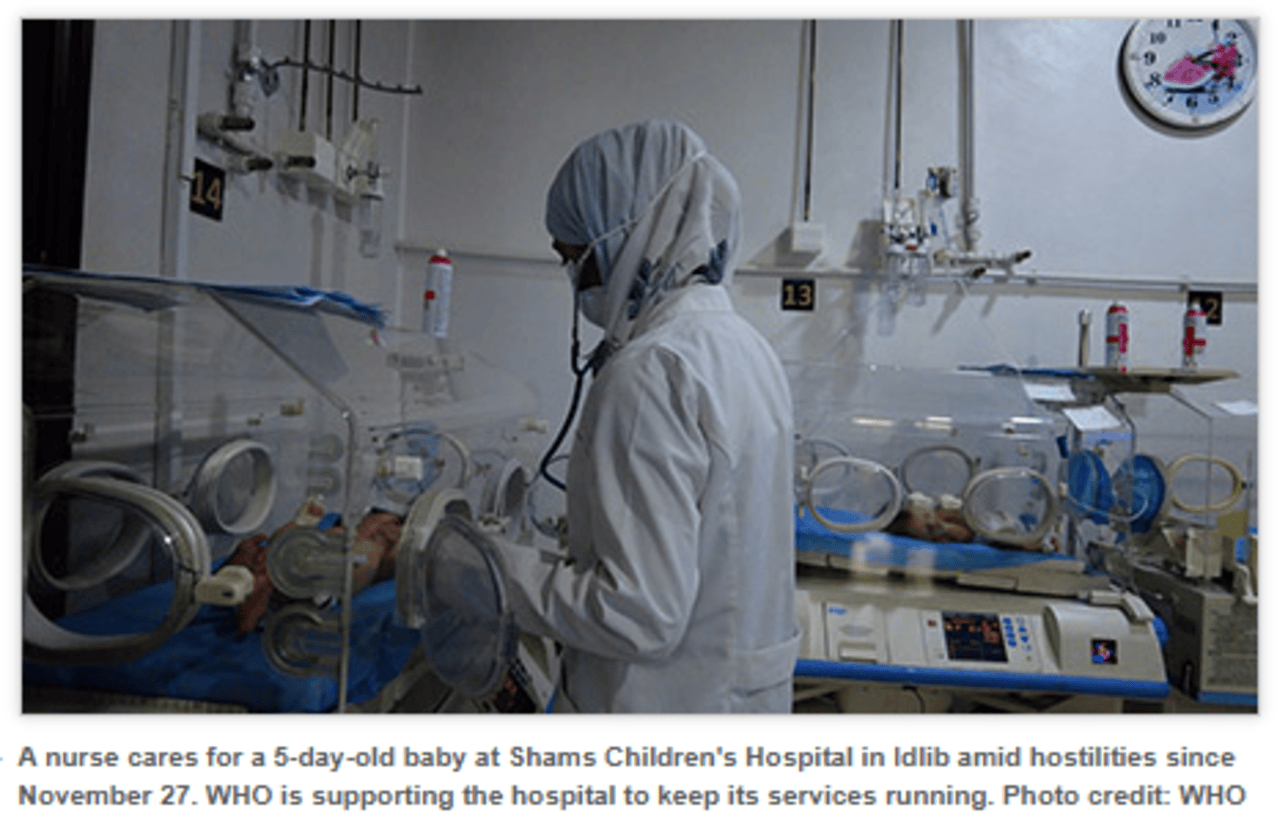24 December 2024, Damascus, Syria/Gaziantep, Türkiye – As Syria stands at a crossroads following the recent transfer of authority, the World Health Organization (WHO) has launched a US$ 56.4 million flash appeal to address the urgent health needs of Syrians affected by years of conflict.
A nurse cares for a 5-day-old baby at Shams Children’s Hospital in Idlib amid hostilities since November 27. WHO is supporting the hospital to keep its services running. Photo credit: WHO
The WHO appeal seeks to address the humanitarian crisis while laying the groundwork for recovery. Over the next six months, WHO together with its partners will continue to focus on trauma care, continuity of essential services, disease outbreak prevention, patient referrals and strengthening health system coordination.
Since November 2024, intensified hostilities have displaced over 882,000 people, further disrupted access to healthcare and placed immense pressure on Syria’s already fragile health system. Attacks on health facilities have surged, with 37 WHO-confirmed incidents reported in the last month alone. These attacks have severely damaged infrastructure, rendered ambulances non-operational and hindered access to life-saving care.
“The health infrastructure in Syria is severely strained, more than ever, with over half the country’s hospitals non-functional. Even before the recent events, 141 health facilities in northern Aleppo and Idlib were at risk of closure due to funding shortages. Without urgent support, these facilities could shut down in the coming weeks, with devastating consequences,” said Christina Bethke, WHO Representative a.i. for Syria. “Our teams are currently providing care through mobile clinics, restoring immunization services and integrating mental health support into health facilities, especially for those affected by trauma. This appeal is about safeguarding health and dignity while offering Syrians hope for a safer future.”
Up to now, WHO’s response has included expanding trauma response in functional hospitals, ensuring healthcare access in high-displacement zones, restoring operations in priority facilities, and working with health authorities to strengthen the health system in several ways.
WHO’s proposed strategy for the next six months includes:
Strengthening life-saving trauma care: Providing emergency supplies, deploying additional ambulances and ensuring hospitals remain operational.
Ensuring continuity of essential health services: Addressing maternal and child health needs, restoring immunization services and deploying mobile clinics to people who would otherwise be unable to access the health system.
Bolstering disease surveillance and outbreak control: Enhancing early warning systems and deploying rapid response teams to contain outbreaks.
Coordinating emergency patient referrals: Facilitating timely and efficient referrals of patients to appropriate healthcare facilities, ensuring access to critical treatment and specialized care.
Enhancing health system coordination: Strengthening partnership across the health sector to ensure a unified and effective health response across Syria.
“WHO will continue to leverage its presence in Gaziantep, Türkiye, to deliver life-saving medical supplies and services,” Rosa Crestani, WHO Emergency Lead for the WHO Gaziantep field office. “This hub coordinates assistance delivered from Türkiye to an estimated 5 million Syrian people, ensuring that essential trauma care, immunization, and maternal health services reach even the hardest-to-reach areas.”
Access the WHO flash appeal for Syria here.



